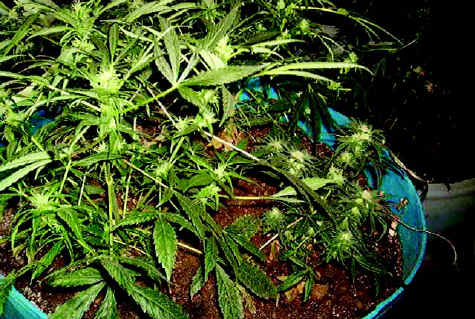Research on the effects of driving under the influence of marijuana concludes that marijuana-induced impairment persists from four to eight hours - long after the subjective effects have worn off. Ninety-four percent of subjects fail roadside sobriety tests 90 minutes after smoking, while 60 percent fail after 150 minutes.
Entries Tagged as 'Marijuana Addiction'
Marijuana Fog, Driving and Coping
October 17th, 2007 · No Comments
Tags: Marijuana Addiction
Marijuana More Harmful Than Cigarettes According To Research Study
August 3rd, 2007 · No Comments
A recent research report published in Thorax - An International Journal of Respiratory Medicine, stated that "one cannabis joint causes a similar degree of lung damage as between 2.5 and five tobacco cigarettes".
Tags: Marijuana Addiction
Marijuana and Psychosis
August 2nd, 2007 · No Comments

Marijuana is the most frequently used illegal substance in many countries, including the United Kingdom and the United States and it seems to increase the chance of becoming psychotic, researchers report in an analysis of past research that brings up the old issue of whether pot is dangerous.
The new review suggests that even infrequent use of marijuana could raise the small but real risk of this serious mental illness by 40 percent.
Doctors have long suspected a connection and say the latest findings underline the need to highlight marijuana’s long-term risks. The research, paid for by the British Health Department, was published recently in the medical journal The Lancet. (thelancet.com)
“The available evidence now suggests that cannabis is not as harmless as many people think,” said Dr. Stanley Zammit, one of the study’s authors and a lecturer in the department of psychological medicine at Cardiff University.
Tags: Marijuana Addiction
Drugs, Alcohol and ADD
July 15th, 2007 · No Comments
Many people with ADD self-medicate (treat their underlying problems) with substances as a way to feel more focused, more together, less anxious, less depressed, less overwhelmed, and just generally better.
Tags: Alcohol Addiction · Drugs and Brain Disorders · Marijuana Addiction
Marijuana Use Damages The Brain
June 2nd, 2007 · No Comments
In studies of patients who had smoked marijuana, Dr. Daniel Amen found significant changes in brain activity, especially those who were heavy users. Decreased brain activity was found in the prefrontal cortex and temporal lobes.
Tags: Drugs and Brain Disorders · Marijuana Addiction
Marijuana Facts
May 7th, 2007 · No Comments
Marijuana is the most frequently used illegal drug in the United States. It is a green, brown, or gray mixture of dried, shredded leaves, stems, seeds, and flowers of the hemp plant. It is called by numerous street names such as pot, herb, weed, grass, boom, Mary Jane, gangster, or chronic. There are also names for different strains or “brands” of marijuana, such as “Texas tea,” “Maui wowie,” and “Chronic.”
Most users roll loose marijuana into a cigarette (called a joint or a nail) or smoke it in a pipe. One well-known type of water pipe is the bong. Some users mix marijuana into foods or use it to brew a tea.
Another method is to slice open a cigar and replace the tobacco with marijuana, making what’s called a blunt. Some blunts include crack cocaine, a combination known by various street names, such as “primos” or “woolies.” Joints and blunts often are dipped in PCP and are called “happy sticks,” “wicky sticks,” or “love boat.” One book of American slang lists more than 200 terms for various kinds of marijuana.
Why do People use Marijuana?
Curiosity and the desire to fit into a social group are common reasons to use the drug. Certainly, youngsters who have already begun to smoke cigarettes and/or use alcohol are at high risk for marijuana use.
Research suggests that the use of alcohol and drugs by other family members plays a strong role in whether children start using drugs. Some young people who take drugs do not get along with their parents. Some have a network of friends who use drugs and urge them to do the same (peer pressure). All aspects of a child’s environment – home, school, neighborhood – help to determine whether the child will try drugs.
Young people who become more heavily involved with marijuana can become dependent, making it difficult for them to quit. Others mention psychological coping as a reason for their use – to deal with anxiety, anger, depression, boredom, and so forth. But marijuana use is not an effective method for coping with life’s problems, and staying high can be a way of simply not dealing with the problems and challenges of growing up.
Health Effects of The Drug
All forms of marijuana are mind-altering and it changes how the brain works. It contains THC (delta-9-tetrahydrocannabinol), the main active chemical in marijuana. It also contains more than 400 other chemicals. Marijuana’s effects on the user depend on it’s strength or potency, which is related to the amount of THC it contains. The THC content has been increasing since the 1970s.
Tags: Marijuana Addiction